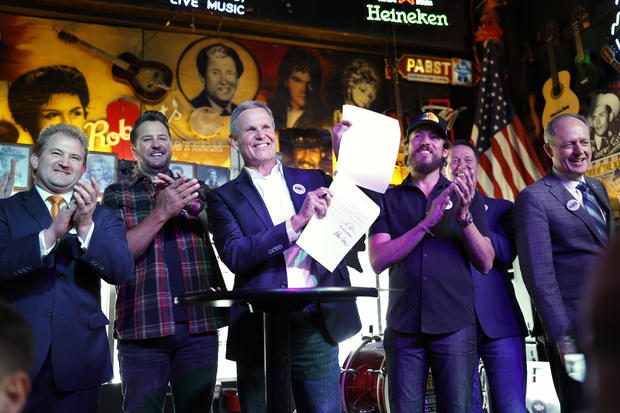- Tennessee passes legislation safeguarding musicians from AI-generated replication.
- Named the ELVIS Act, the law extends property rights to vocal likeness alongside names and photographs.
- Individuals now have legal recourse against unauthorized use of their voice and AI replication of their identity.
- Despite bipartisan support, the law’s efficacy remains uncertain.
- Renowned musicians emphasize the urgency of addressing AI threats to artistic integrity.
- Governor Lee signs the bill at Nashville’s Robert’s Western World, honoring Elvis Presley’s legacy.
- Tennessee’s legal history, particularly the Personal Rights Protection Act of 1984, underscores the state’s commitment to protecting public figures’ rights.
Main AI News:
In a groundbreaking move, Tennessee Governor Bill Lee has signed into law a measure aimed at safeguarding the interests of songwriters, performers, and other professionals in the music industry from the potential perils posed by artificial intelligence. This historic development solidifies Tennessee’s reputation as a trailblazer in the realm of music, being the first state in the U.S. to enact such comprehensive measures.
The legislation, slated to take effect on July 1, signifies a pivotal step towards ensuring that AI technologies cannot replicate an artist’s voice without their explicit consent. Governor Lee emphasized the significance of this legislation, stating, “Artists possess intellectual property and unique gifts that are distinctly theirs, not artificial intelligence’s.”
Termed the Ensuring Likeness, Voice, and Image Security Act (ELVIS Act), the newly enacted statute expands the definition of property rights in Tennessee to encompass vocal likeness, alongside names, photographs, and likenesses. Under this law, individuals will have recourse to legal action against unauthorized use of their voice, as well as technologies employed to replicate their identity without proper authorization.
Nevertheless, the efficacy of this legislation in shielding artists’ creations from AI infringement remains to be tested. While enjoying widespread support within the music industry and bipartisan backing in the Tennessee Statehouse, the true impact of the ELVIS Act is yet to unfold. Despite the rarity of such bipartisan consensus amidst political divisions, the urgency of addressing the imminent threats posed by AI to musicians’ livelihoods cannot be overstated.
Renowned Tennessee musicians, such as country star Luke Bryan, underscore the pressing need for action, highlighting instances where AI-generated content closely resembles their own work. Bryan remarked, “It’s a real deal now, and hopefully, this will curb it and slow it down.“
The significance of this legislative milestone was underscored by Governor Lee’s choice of venue for the bill signing ceremony, held at the iconic Robert’s Western World in Nashville’s Lower Broadway. By naming the statute after the legendary Elvis Presley, Tennessee pays homage to one of its most revered cultural icons while reinforcing its commitment to protecting the rights of its creative community.
The decision to honor Presley through legislation is deeply rooted in Tennessee’s legal history, dating back to the contentious legal battles following his death in 1977. The enactment of the Personal Rights Protection Act in 1984 marked a pivotal moment, affirming that personality rights endure beyond death and are inheritable. This legislative precedent, initially aimed at safeguarding Presley’s estate, has since been hailed for safeguarding the rights of all Tennessee public figures.
With vocal likeness now included among the protected rights, Tennessee remains at the forefront of legislative innovation, setting a precedent for other states to follow in safeguarding the creative integrity of its artists against the ever-evolving landscape of technological advancements.
Conclusion:
The passage of the ELVIS Act in Tennessee marks a significant milestone in protecting the rights of musicians against AI infringement. This legislation reflects a proactive approach to addressing emerging technological challenges in the music industry. However, its true impact will depend on its enforcement and effectiveness in mitigating the threats posed by AI-generated content. As the first state to enact such comprehensive measures, Tennessee sets a precedent for other jurisdictions to follow, highlighting the increasing importance of legislative frameworks in safeguarding creative industries from technological disruptions.

